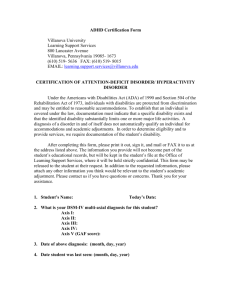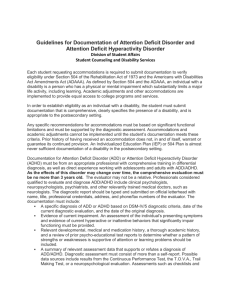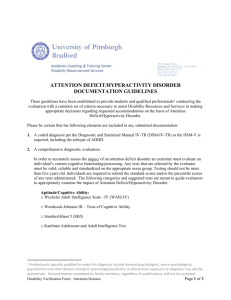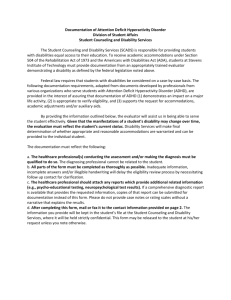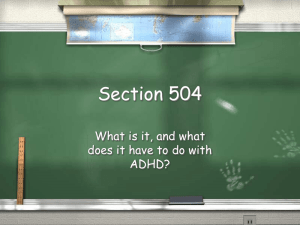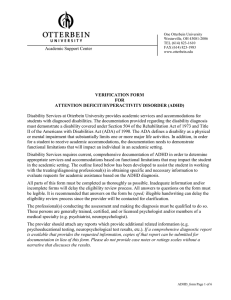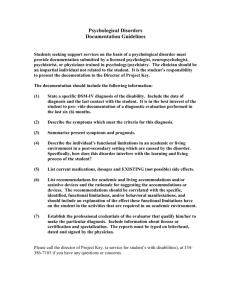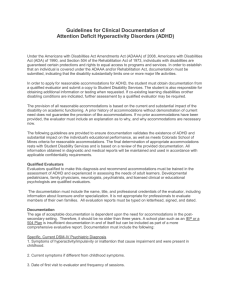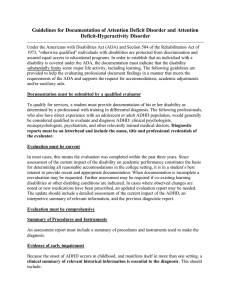Word - University of Maine Farmington
advertisement
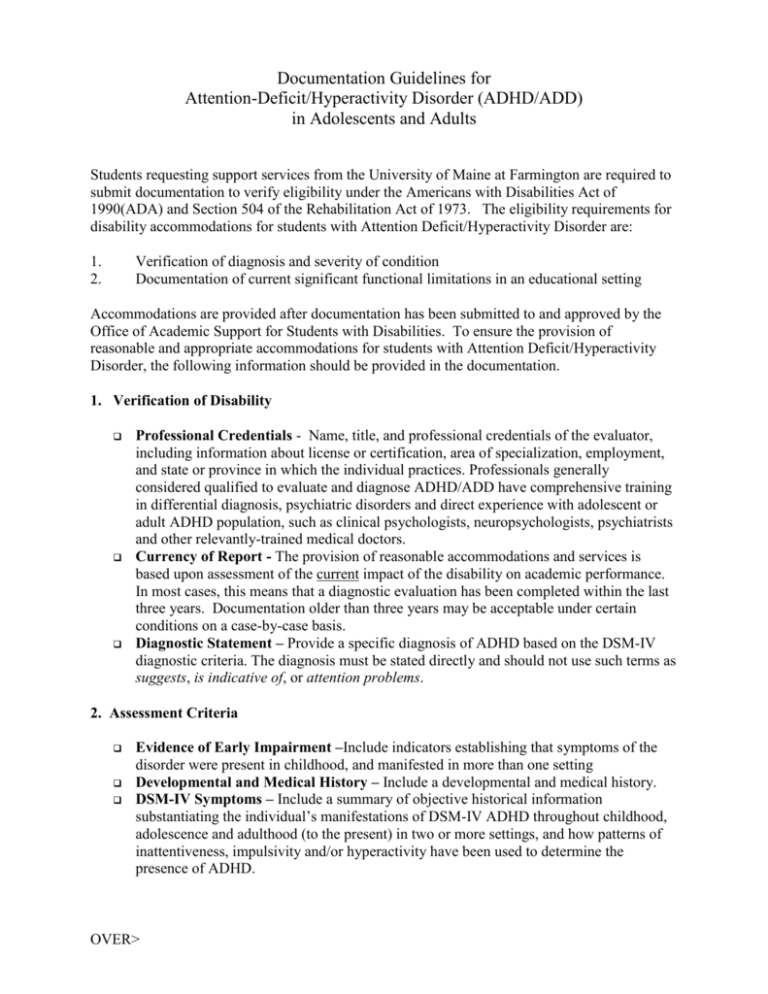
Documentation Guidelines for Attention-Deficit/Hyperactivity Disorder (ADHD/ADD) in Adolescents and Adults Students requesting support services from the University of Maine at Farmington are required to submit documentation to verify eligibility under the Americans with Disabilities Act of 1990(ADA) and Section 504 of the Rehabilitation Act of 1973. The eligibility requirements for disability accommodations for students with Attention Deficit/Hyperactivity Disorder are: 1. 2. Verification of diagnosis and severity of condition Documentation of current significant functional limitations in an educational setting Accommodations are provided after documentation has been submitted to and approved by the Office of Academic Support for Students with Disabilities. To ensure the provision of reasonable and appropriate accommodations for students with Attention Deficit/Hyperactivity Disorder, the following information should be provided in the documentation. 1. Verification of Disability Professional Credentials - Name, title, and professional credentials of the evaluator, including information about license or certification, area of specialization, employment, and state or province in which the individual practices. Professionals generally considered qualified to evaluate and diagnose ADHD/ADD have comprehensive training in differential diagnosis, psychiatric disorders and direct experience with adolescent or adult ADHD population, such as clinical psychologists, neuropsychologists, psychiatrists and other relevantly-trained medical doctors. Currency of Report - The provision of reasonable accommodations and services is based upon assessment of the current impact of the disability on academic performance. In most cases, this means that a diagnostic evaluation has been completed within the last three years. Documentation older than three years may be acceptable under certain conditions on a case-by-case basis. Diagnostic Statement – Provide a specific diagnosis of ADHD based on the DSM-IV diagnostic criteria. The diagnosis must be stated directly and should not use such terms as suggests, is indicative of, or attention problems. 2. Assessment Criteria Evidence of Early Impairment –Include indicators establishing that symptoms of the disorder were present in childhood, and manifested in more than one setting Developmental and Medical History – Include a developmental and medical history. DSM-IV Symptoms – Include a summary of objective historical information substantiating the individual’s manifestations of DSM-IV ADHD throughout childhood, adolescence and adulthood (to the present) in two or more settings, and how patterns of inattentiveness, impulsivity and/or hyperactivity have been used to determine the presence of ADHD. OVER> Rule Out Alternative Causes –Indicate that alternative psychological, medical or noncognitive (e.g.; educational; cultural) explanations have been investigated and ruled out as causes for inattentiveness, impulsivity and/or hyperactivity. Medical Treatment – Provide relevant current medical history. Indicate whether or not the individual was evaluated while on medication prescribed for the treatment of ADHD, and whether or not the prescribed treatment produced a positive response. 3. Educational Impact History of the type and degree of limitations to learning- Include a summary of objective historical information about the educational impact of the ADHD from childhood to the present such as transcripts, report cards, teacher comments, tutoring evaluations, past psychoeducational testing, and other third party interviews. The individual’s history of using academic accommodations should be documented. If no history exists, then an explanation should be included regarding why accommodations were not used, and why they are now needed. Current educational impact- Specify how ADHD currently impacts the individual’s academic functioning. Document current and substantial limitation to learning for which the individual is requesting accommodation, including how the disability impacts course examinations (if accommodations are being requested in this area). 4. Accommodation recommendations and justifications- Indicate why specific accommodations are needed and how the effects of ADHD symptoms, as designated by the DSM-IV, are mediated by the accommodations. 5. In addition to the diagnostic report, please attach other information relevant to this student’s academic adjustment. Return this information marked confidential to: Claire Nelson Coordinator of Academic Support for Students with Disabilities University of Maine at Farmington 224 Main Street Farmington, ME 04938 OVER>
